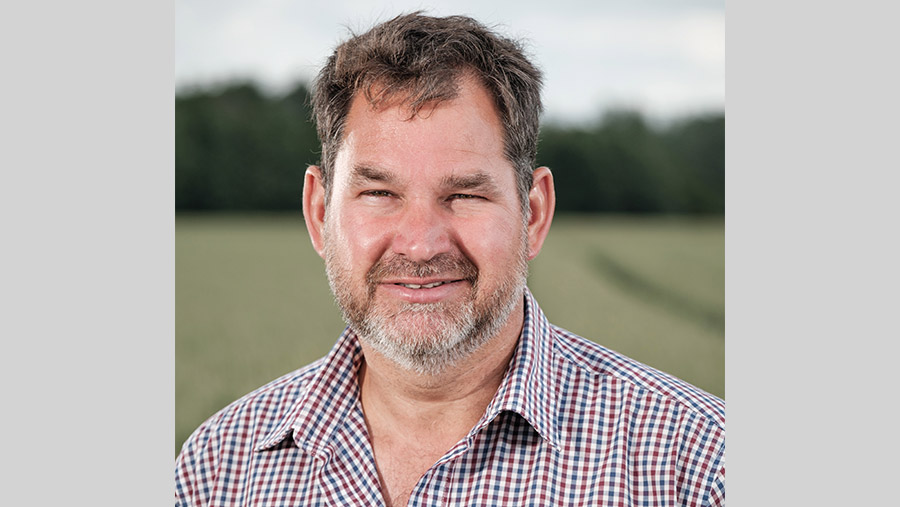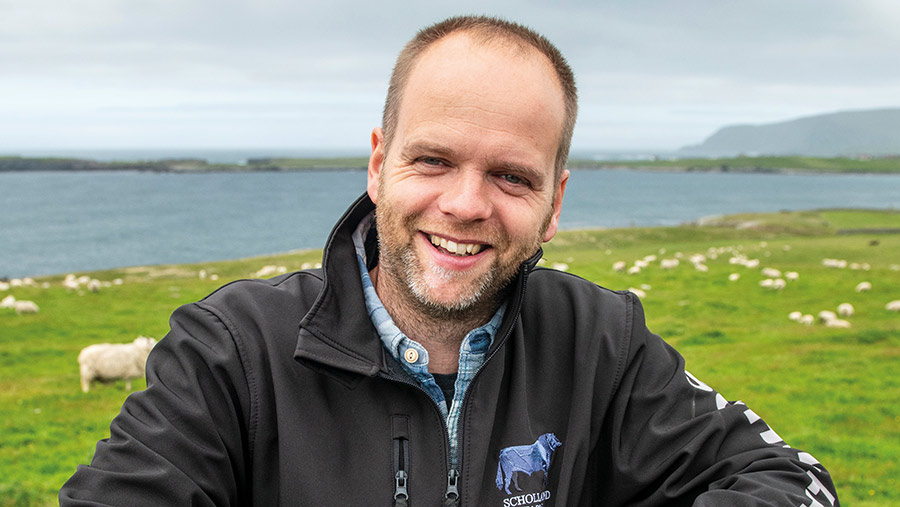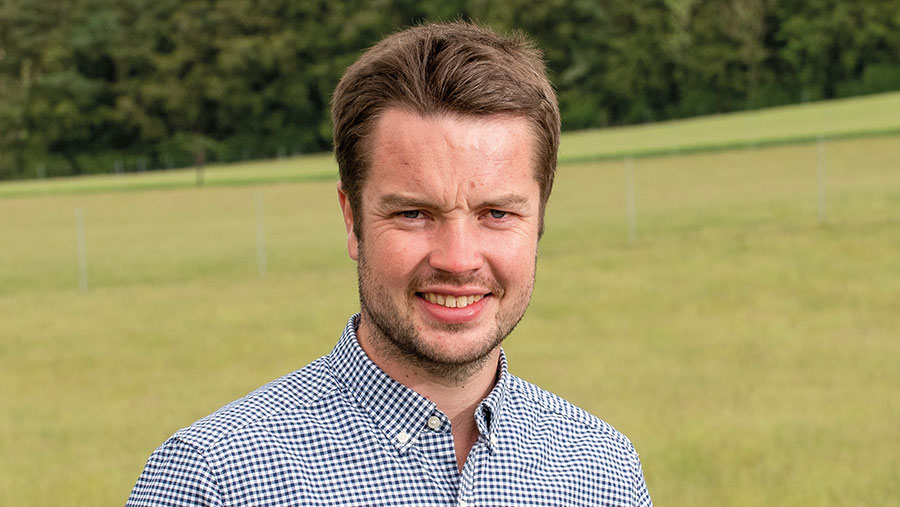Farmers Weekly Awards 2022: Mixed Farmer of the Year finalists

This year’s finalists all show a passion for sustainable farming and are running mob-grazing systems to improve grassland management and optimise output.
They have a real drive to cut input costs and improve soil health – seeking the optimal balance of arable and livestock on farm.
The judges visited each finalist for a three-hour visit and a tour of their setup.
See all of the category finalists for the 2022 Awards
The finalists:
Angus Gowthorpe
Approach Farm, Yorkshire
Jamie Leslie
Scholland Farm, Shetland
Stuart Mitchell
Whitriggs Farm, Scotland
The judges:
Paul Temple
Last year’s winner
Emma Gillbard
Farmers Weekly arable reporter
Andrew Robinson
Agricultural accountant at Armstrong Watson
Angus Gowthorpe
Approach Farm, Yorkshire

Angus Gowthorpe, Farmers Weekly Awards 2022 Mixed Farmer finalist © Jim Varney
North Yorkshire beef and arable farmer Angus Gowthorpe began his regenerative agricultural journey eight years ago, placing soil health at the heart of crop production.
During this time he has significantly reduced inputs cost and largely maintained crop yields at Approach Farm, where he farms 160ha and 40 pedigree Saler suckler cows.
Insecticides, plant growth regulators and purchased phosphorus and potassium were eradicated four years ago and he can now confidently grow crops without synthetic fungicides.
Although he admits “they are still part of the agronomy tool box if needs be.”
Instead, he fuels the health of his soils and crops through a combination of home-brewed microbe and fungal mixes, which saves more than £90/ha/year on a typical winter wheat field.
What’s more, he has cut nitrogen rates by two-thirds through the use of foliar nitrogen feed, which offers four times greater efficiency over granular nitrogen.
Operating a no-till system since 2014, the key to his regenerative success is a long and diverse rotation, growing wheat blends, barley, beans, oilseed rape, linseed and oats.
Thanks to his suckler herd, muck is applied across the whole rotation to improve organic matter levels.
He also incorporates catch, cover crops and grassland for grazing and silage to improve soil health and sequester carbon.
He prides himself in promoting farm biodiversity through the Mid Tier stewardship scheme.
Beef cattle
Just like the arable enterprise, there has been a drive to lower costs and promote sustainability within the beef herd, where cattle are predominantly sold for breeding.
Using Breedplan genetic evaluation combined with visual assessments, Mr Gowthorpe improved fertility, growth rates and visual traits of his Saler cattle.
Grass leys were transformed into herbal leys and clover mixes, which eliminated nitrogen use on forage ground.
Combined with the introduction of mob-grazing this has greatly improved forage utilisation and lowered costs.
“We saved £8,500 last year for an outlay on fencing and water pipes of £3,700. With no further outlay, the saving will be more than £10,000 this year,” he says.
He has also stopped using fly treatments on the cattle and instead uses garlic lick minerals, while faecal egg counts are calculated in the weanlings to decide whether worming is necessary at housing.
Next steps
In the next five years, Mr Gowthorpe aims to increase the arable business, and with the delivery of a new Horizon 6m drill this summer, he hopes to drill bi-crops, such as oats and beans, with accuracy that will further reduce drive down costs and improve soil health.
Mr Gowthorpe also runs a contracting business, drilling about 700ha each season.
Actively involved with the wider agricultural industry, he has been a Base UK Committee member for five years and Saler Society Council member for 12 years.
He is on the Future Farmers of Yorkshire associate board, the Yorkshire Agricultural Society Council and the Great Yorkshire Show beef committee.
Mr Gowthorpe was also involved with the set-up of The Green Farm Collective – a collaboration of six farmers which plan to add value to farm businesses that are following regenerative agricultural methods.
Through this, they hope to trade carbon and biodiversity to maximise returns to the farmer, while creating their own logo and packaging to promote their produce and reap a bigger slice of the retail pound.
What the judges say
It is clear to see the passion and attention to detail Angus has to make his soils sustainable and is the driver of his farming. The results were obvious to see and the reduction in input costs is very impressive.
Angus Gowthorpe summary
The judges liked
- Innovative thinker with passion to take risks and try new things
- Impressive focus on soil health, linking this with plant and livestock health
- Attention to detail that has driven down costs across each business enterprise
- Maintaining output and quality through change in agricultural practice
- Excellent use of mob-grazing
- Addition of cattle value through pedigree breeding
Farm facts
- 160ha mixed beef and arable farm in North Yorkshire
- No longer using plant growth regulators, insecticides and purchased phosphorus and potassium
- Topped the breed premier sale at Castle Douglas this autumn with a pedigree bull
- One of six farmers to set up The Green Farm Collective
- Operates a contract direct-drilling business alongside the farm
The numbers
- 40 pedigree Saler suckler cows plus followers
- Eight years into regenerative agricultural journey
- £90/ha saving by not using synthetic and instead using microbe and fungal brews
- Four times greater efficiency using foliar nitrogen spray over granular
- £10,000 saving this year through mob-grazing
- 700ha of direct-drilling contracting business carried out annually
Jamie Leslie
Scholland Farm, Shetland

Jamie Leslie, Farmers Weekly Awards 2022 Mixed Farmer finalist © Dave Donaldson
Running a 330ha beef, sheep, pig and arable farm in the most northern corner of the UK certainly comes with its challenges.
Faced with extra freight costs, challenging weather and soils with up to 76% sand content, sixth-generation Shetland farmer Jamie Leslie’s focus on grassland management has seen him slash costs and increase grass use by 345kg dry matter (DM)/ha/day.
Thanks to a leader-follower rotational grazing system with ewes and lambs followed by suckler cows, Mr Leslie added 2kg onto lamb weaning weights and increased cattle daily liveweight gain by 0.42kg.
This season, all 90 suckler cows grazed grass with no supplements for 274 days. Two-thirds of the herd were then housed for calving, with the remainder left out to bale graze, saving £92 a cow over winter.
Marketing
Most livestock are taken through to fat, with a proportion of lambs sold as stores. Mr Leslie has a close relationship with the local butcher, supplying 27.5t of beef last year.
He now sends a couple of bullocks, lambs and pigs to the shop each week.
“We are in weekly contact with the butcher to make sure their expectations are met. Visiting the shop and seeing our produce displayed is a thrill every time,” he says.
Mr Leslie and his wife also sell more than 40 direct meat boxes of beef, lamb and pork, and graze a batch of lambs in the Scottish Borders in a joint venture, which are marketed through Farmstock.
Cropping
Across the farm, 70ha of land is croppable. Mr Leslie grows 10ha of the spring barley variety Salome, which he imported from Scandanavia for its early maturity and yield.
“A week-earlier harvest is a huge benefit this far north and can give us opportunity to establish Italian ryegrass for an early spring bite,” he says.
Yields historically achieved 5t/ha, but with the aim to drive this forward he got involved with the cereal and grass Yield Enhancement Network. His proudest moment was achieving a spring barley yield of 8t/ha from just 58kg N/ha.
The use of foliar nutrient sprays have been groundbreaking at Scholland Farm as maintaining nutrient levels across sandy soils composed of up to 1m of blown sand can be difficult.
Through a range of on-farm trials, he found a 20kg application of foliar nitrogen and 5 litres/ha of foliar potassium increased grass yields by 29%, with improved protein and energy levels.
He now aims to use foliar sprays across all land to cut nitrogen use by 50% with no detriment to yield. He has even adapted a sprayer to enable applications across challenging terrains.
Furthermore, 8ha of fodder beet and 3ha of kale is grown. Beet is direct-drilled with a proportion of land companion cropped alongside a crop of oats to aid establishment.
Beet can be grown for 4p/kg DM eaten, which has halved feed costs of steers when wintered outside.
Promoting UK agricultures and getting the positive message across to young people is something Mr Leslie and his wife believe strongly in, which is why they have hosted numerous class visits on farm over the years.
What the judges say
A great example of adapting to unique challenges. Dealing with blowing sand soils, brutal weather and small fields, Jamie developed mob-grazing and crop production to suit the environment and cut input costs.
Jamie Leslie summary
What the judges liked
- Farming successfully and in harmony with an extreme environment
- Improving productivity of farmland and livestock while using less inputs
- Improved marketability of end product through close relationship with butcher and direct meat boxes
- Strategic use of foliar nutrition sprays to improve crop health
- Desire to continue to reduce nitrogen inputs and concentrate feed and maintain output
Farm facts
- 330ha farm
- Sixth-generation farmer on Shetland running 90 angus suckler cows, 50 bought-in fattening cattle, 950 ewes and 250 fattening pigs
- Expanded farm significantly from 40 cows and 250 ewes by purchasing two blocks of land and taking on a new lease
- Family also run a small herd of Pedigree Aberdeen Angus cattle within the main herd
- Hope to sell more than 30t of beef this year to the local butcher
- Actively involved with Farmax benchmarking group to drive business forward
- Mr Leslie also runs a scanning business
The numbers
- 76% sand content in some soils
- 345kg DM/ha/day increase in grass utilisation through improved grassland management
- £92/cow saving through outwintering and deferred grazing
- 27.5t of beef sold to local butcher last year
- 40 home produce direct meat boxes sold
- 8t/ha yield of spring barley from just 58kg N/ha
- 29% increase in grass yield for use of foliar applied nutrients
Stuart Mitchell
Whitriggs Farm, Scotland

Stuart Mitchell, Farmers Weekly Awards 2022 Mixed Farmer finalist © Angus Findlay
After taking over the family mixed farm in Scotland four years ago, Stuart Mitchell successfully adapted the conventional beef and sheep farm via the set-up of a new deer enterprise and conversion to organic farming status.
Faced with the looming threat of subsidy loss, labour challenges and rising costs, Mr Mitchell aimed to improve the sustainable future of the farm, which now runs 140 sucklers and 330 breeding hinds and grows organic milling oats.
While the 1,000 Lleyn ewe flock was profitable, blood sampling revealed a high level of maedi visna, so the difficult decision was made to sell the sheep and refocus the business in a different direction.
After a lot of planning, research and business assessments, the family made the bold step into the world of deer farming, which saw them establish 20km of deer fencing themselves.
Mr Mitchell even built his own unique deer handling facility, placing efficiency, animal welfare and staff safety at the cornerstone of his design.
The family now run a low-input system that complements the low-input Shorthorn Angus-cross suckler herd.
This prompted him to become a certified organic farm in order to add further value to their products.
Beef
With the sheep off the farm, a significant proportion of ground suitable for outwintering cattle became available.
This enabled wintering costs to be cut from £11 to £3.90 a cow each week – a total saving of about £25,000.
Cattle now feed 50% from hay bales and 50% from deferred grass via strip grazing.
Mr Mitchell designed his own bale unroller, which simply hitches to the quad bike and feeds the 140-cow suckler herd over winter each day.
“The ability to outwinter stock has been a big achievement for us as we used to house cattle for six months of the year. It has drastically reduced our inputs, improved cattle health and significantly reduced labour requirements,” he says.
Furthermore, the use of mob-grazing throughout the spring and summer has been a pivotal grazing strategy, allowing the build-up of an autumn grass stockpile, to carry calves through the first half of the winter outside.
It has also been great for biodiversity increase across the farm.
Cattle are then sold store through a co-op, and more recently the family have been selling direct to farmers looking for low-input cattle produced on a grass-based system with no concentrate feed.
With a firm focus on benchmarking, Mr Michell noted that their later calving cows cost the most, prompting him to shorten the bulling period to six weeks and achieve a 90% scanning rate over the past three years.
Oats
On the arable side, 50ha of organic milling oats are grown, with grain sold to a local mill just 15 miles away destined for porridge and oatcakes.
Oats consistently meet milling specification and Mr Mitchell recently invested in a new drier and storage facility to add further value to the product.
Always up for a challenge and not afraid to try something new, he has successfully trialled pasture cropping by drilling winter oats into a grass ley to provide a grazing crop for cattle.
This acts as a complete forage diet and grass buffer area for an extended grazing season. He has also tried undersowing milling oats with a living mulch of clover to promote soil and crop health.
Actively involved in knowledge transfer between farmers, the family frequently host farm tours and have been a Quality Meat Scotland Monitor Farm host. More recently, Mr Mitchell has given talks to local farmer groups and visited a secondary school.
What the judges say
The Mitchells drove the business forward when they sold their flock. Now operating a mob-grazing system and outwintering of cattle to reduce costs, the investment in and passion for the new deer herd was clear to see.
Stuart Mitchell summary
What the judges liked
- Transformed the farm into a successful deer enterprise using own initiative, research and planning
- Built and designed an impressive handling system from scratch with great design and skill, with focus on animal welfare and operator safety
- Achieved a remarkable work-life balance through the focus on operating a simple, effective and low-input system
- Substantially cut business costs, labour requirements and fuel use across the business
- Great focus on the environment and effective use of mob-grazing
- Ability to trial new things and improve soil health through organic conversion, pasture cropping and undersowing
Farm facts
- 440ha organic farm with 140 suckler cows, 330 red deer and 50ha cereals
- Sold the sheep flock four years ago and set up a dear enterprise to reduce labour and improve work-life balance
- Upland and lowland farm with two-thirds of the farm ploughable
- Stock are not fed creep feed, with the family’s main focus being grassland management
- Experimented with pasture cropping and undersown clover leys to further reduce inputs and improve soil health
- Clay loam soils
The numbers
- 330 breeding hinds on farm replaced the flock of 1,000 ewes
- 20km of deer fencing established themselves
- £25,000 saving from outwintering suckler cows
- 90% scanning rates in cattle herd
- 50ha of organic milling oats grown for porridge and oat cakes
Sponsor’s message

Cawood is delighted to be sponsoring the Mixed Farmer of the Year award again this year.
We deliver key analytical services to both arable and livestock farmers across the UK while supporting a safer, healthier planet in all we do. Highlighting the achievements of mixed farmers who form sustainable farming businesses from two or more complementary operations is very important to us.
We wish all finalists good luck, and we look forward to celebrating alongside our customers and colleagues at the awards ceremony later this year.
Rory Geldard, commercial manager, Cawood
